As Orthodox death rites require, Dida, her mother Baba and son Nikola are on their annual visit to the graveyard to celebrate the life of their deceased relative with food, drinks and memories.
“You should film this,” says Dida, who is at the heart of the documentary with the same name. She is speaking to her son Nikola, co-director of the film, in front of her father’s grave.
The camera, sitting invisibly just a few meters away, is already filming her, turning the viewer into a participant in the reflections, jokes and remembrances on the screen.
Sarma and rakija honor the man who passed away years ago, but also indicate that the event cannot be taking place anywhere other than in the Balkans. The Serbian-born director Nikola Ilić and Swiss-born director Corina Schwingruber Ilić — his long-time partner in both life and filmmaking — shot the documentary for over a decade between Belgrade and their home in Lucerne, Switzerland.
These relations between characters and Nikola’s voice-over narration are the prelude to an intimate observational documentary.
“Cheers to life granny,” says Nikola. Rakija and toasting are inseparable, even at the graveyard.
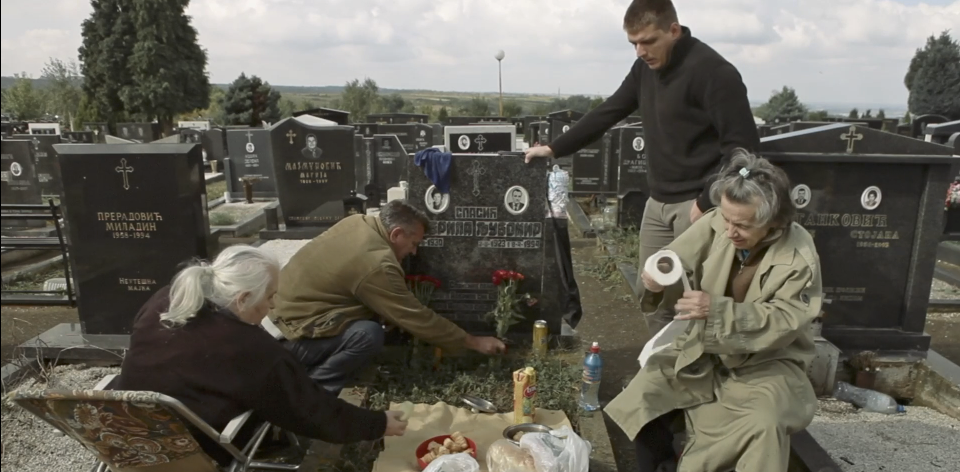
Still from Dida.
“You don’t say cheers to life but for the soul,” Baba (grandmother in Serbian) corrects her grandson. Her voice is imposing, full of character, anticipating the way she and Dida steal the show. The documentary is about Nikola’s life lived between two countries and shared with three women: his mother, his grandmother and his wife. But it is particularly about Dida.
Through Nikola’s questions we understand that Dida had a seizure when she was two years old and since then has faced serious learning disabilities. While Nikola tries to get to know his mother, we on the other side of the screen cannot but ask ourselves: Do we actually know our parents and vice versa? Do we understand how their life experiences have shaped their carefulness and neglect, their authoritarianism and self-sacrifice?
But most of all Nikola leads us to ask, “Can parents and children live independently from each other, particularly in an era of institutionalized ageism?” Meanwhile his exploration of a migrant’s struggle between two worlds reminds us that the diasporic experience is destined to be full of nostalgia and backwards glances.
A film’s meaning is never transparent, but an object to be interpreted. We can read traces of the past and present not just through the Ilić family but through the material culture they inhabit. The minimalism of a Swiss apartment speaks loudly in contrast to Dida’s detritus-filled living room. Through these contrasts the viewers can imagine a whole social and personal history.
Nikola and Corina are looking forward to having the premiere in Belgrade and taking Dida up on stage. They had their regional premiere at the DokuFest Film Festival festival in Prizren, and are about to have another screening at MakeDox Film Festival in Skopje, Macedonia.
During DokuFest, K2.0 caught up with the co-directors on a sunny morning at Prizren’s Lumbardhi cinema to talk about Dida, Baba, and being protagonists in their own observational documentary.
K2.0: We understand in the beginning that Dida suffered from a malignant tumor that threatened her life. What kind of effect did this have on you as you made the documentary? Did the thought of losing Dida influence the kind of dedication you had to her?
Nikola: That is exactly the case. There is one feeling I had in me which I had throughout the whole research process, and I would share those feelings with other people and it was like talking to a shrink. I sometimes felt naked.
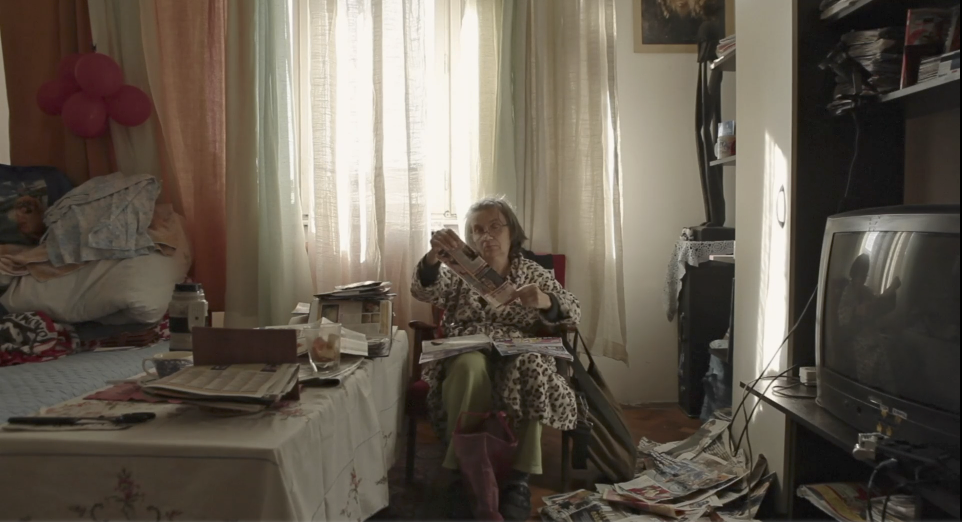
Still from Dida.
The feeling that I had that my mom — she is special, as you saw in the movie. When I was a student in primary school she would always have on a ski suit and boots. When she would come to school she would be so odd, always in the corner and she wouldn’t talk to people.
I was ashamed of her and inside of me I was always like, “Why can’t my mom be cool?” This is this thing I had in me and when I grew older I felt ashamed.
This is one of my triggers and throughout my growing up and teen days I had a punk band and I was a skater and stuff but never talked to her. She was more like a little sister, more than my mother. She was my biological mother, but my grandmother was my mother.
I was so afraid she was gonna die because the diagnosis was really bad. Then I thought before she was gone, I thought I had to talk to her, and I started filming and I never thought that this was going to be a movie.
It was like just putting the camera on the couch and we were just having a rakija and coffee with her for hours. And this would happen for a few years until Corina, who is the engine of the movie, came along and she was like, “Maybe we can make a movie.”
I was like, “I don’t know if it’s a good idea,” and anyway we went to a film-development workshop in Prague and this is quite a few years because it took a long time to be done.
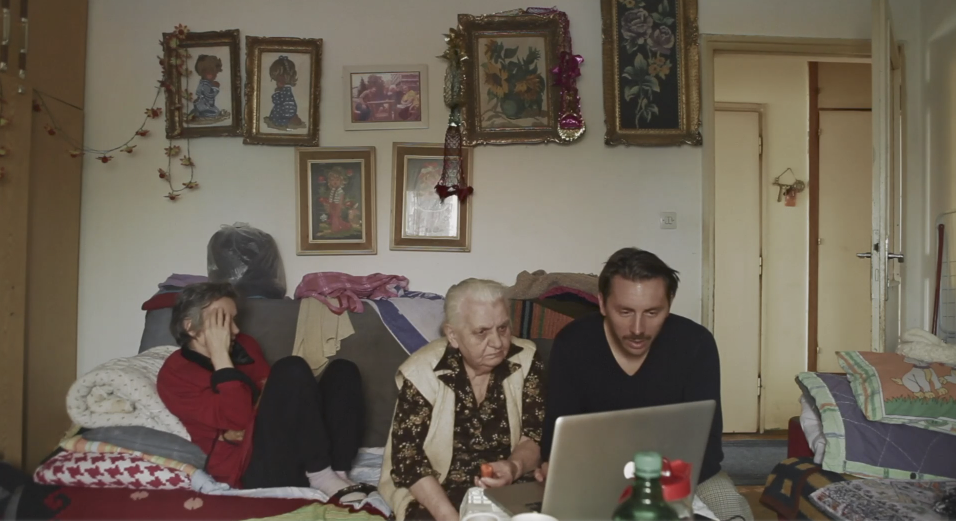
Still from Dida.
I don’t know my father and this is the thing we didn’t talk about in the house. She didn’t like him and he was an alcoholic back then and for her this is the end. I wanted to know her better.
Inside of her she can do much more, but she has this shield protecting her and we tried to come inside. But it was really hard and it took me quite some years and I still didn’t get to her all the way.
Corina, what triggered you to push for the documentary to be made and participate as a co-director and character?
Corina: At first it was because I was like “Why would you film this if it’s just going to end up in a box?”
And then in 2009 I finished film school and I made a movie in Belgrade and I also filmed Baba and Dida. And they really liked to be filmed. And also for Nikola to film these meetings or these coffees with this mother was something they liked to do together. Because otherwise they wouldn’t have any common thing to do.
And we were also interested in the symbiosis between Baba and Dida because they couldn’t live without each other. And then through the workshop we realized it is more about Nikola and relationship to his mother.
I think a lot of personal documentaries start when you want to shoot something and then you realize that actually you are much more involved as filmmakers than you think. And then we were like, “Should we really go there and make it so personal? To include both of our perspectives in the film?”
But we decided, happily for me, (laughs) just to focus on Nikola.
First we stopped filming only Baba and Dida and started filming also Nikola. And we didn’t want to have a voice-over from the beginning because we like more observational documentaries. But we realized that we didn’t catch a lot of moments, so we had to have a voice-over and we had to decide if it would be a discussion between the two of us.
So it was a long process to get to the point to realize it should just be Nikola doing the voice-over. It was especially hard for Nikola because he really didn’t want to put himself in the center. We wanted to put Dida and Baba in the center.
But these development workshops had helped a lot and talking to other people there and we came to that point and said “Okay, let’s do it.”
What did you discover during this long process of filming? Was there a particular revelation about Dida, Baba, but also about the two of you?
Nikola: It is a big chunk of life. It is 10 years. And eventually four generations: my grandmother, my mother, us and now we have children. We became parents and Dida became a grandmother.
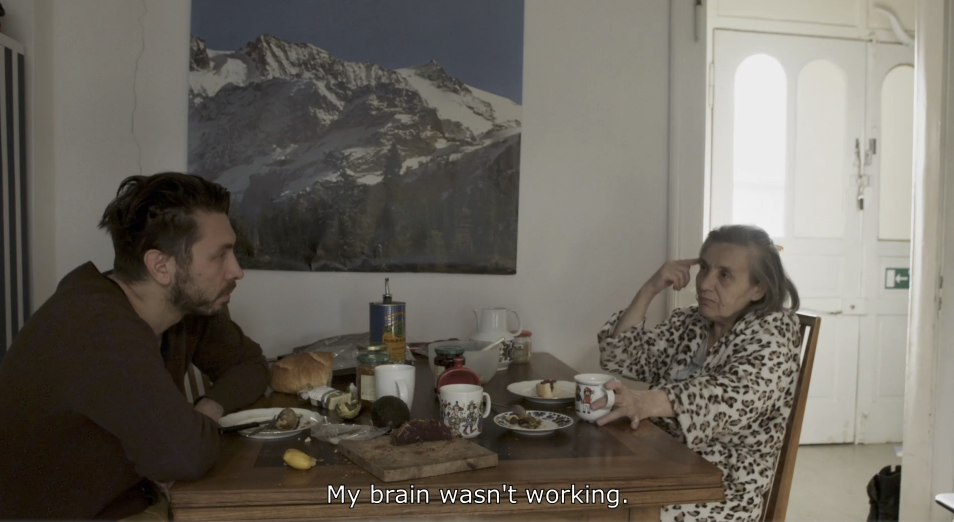
Still from Dida.
So it is a whole generational switch. My mom is who she is. I am going to sound cheesy now but I am living for the day when we will have the premiere in Belgrade and this is for me the biggest premiere so I can take Dida on stage because she always saw me filming since I was a kid, but she doesn’t get what I do or what we do and now she is gonna see us for the first time in a film festival. And I can take her on stage and she will like that, I know, she is going to be the star and we already told her we’re gonna get you — she likes red as you saw in the movie — so she will have a red dress.
So I can live with relief in a way I couldn’t in the beginning of the movie. I don’t want to feel ashamed of my mother. This is my mother and this is who we are.
Corina: It became so normal to us that we didn’t really reflect about it. It was just something our family was connected to.
For example when we stopped filming, or when we didn’t film, they were always like, “Why aren’t you filming?” Because we were tired of filming and then something happens which would be good for the movie, you know conflict, or something which we didn’t catch and we were always stressed. But that is the process of filming.
On the other hand with Dida, we said to ourselves we won’t do anything just for the movie, like we won’t put Dida in a situation just for the movie to make it more interesting. We really wanted to be honest and that was our main goal, to really be honest and to show what really happened. Of course when you edit the movie and when you film a movie it is not always reality but we are as close as possible.
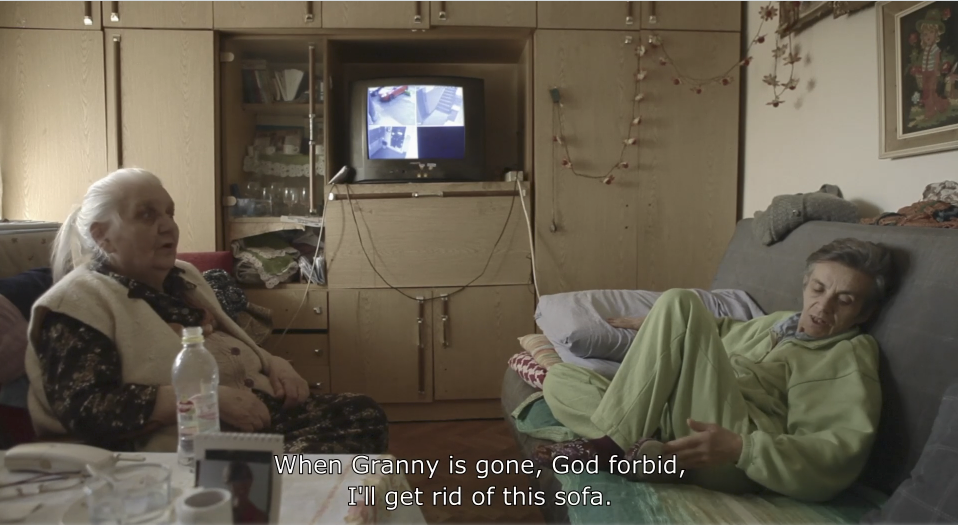
Still from Dida.
So Baba is Baba, I didn’t discover anything new there, but with Dida we really hoped that through the process, she would become independent. We really believed she could live independently and a lot of people who watched the movie, especially the Swiss people were like, “Why didn’t you just get her to an [elderly] home? It is so obvious she can’t do it, why did you even try longer and longer?”
And the Balkan people somehow understood it much more because for them it’s just clear that you would try everything to not put your mother away [at an elderly home care], that it is your responsibility. But we really hoped she could do much more. In the end we just had to realize that there is a limitation.
Isn’t this limitation linked to how states see the elderly? The elderly in the region lose their rights the moment they aren’t participants in the economy anymore. Discrimation toward them is expressed also in the failure to provide support through activities, or decent home care, and doesn’t this make it impossible to have independence from family members?
Corina: That’s why we thought that probably it is a movie and not just a personal story about our problem. It is a very big topic, especially for Balkan people but also any migration country, and also now with globalization. Even for Swiss people who moved to America they suddenly come to the question, “What are you doing with your parents when they get older?”
So it is a global topic, but it might be an easier question for the Swiss because there it is not bad to put your parents in a home and we have good homes for the elderly. And even the elderly, for example my parents, wouldn’t mind going there. To them it is quite clear that actually they would want to go.
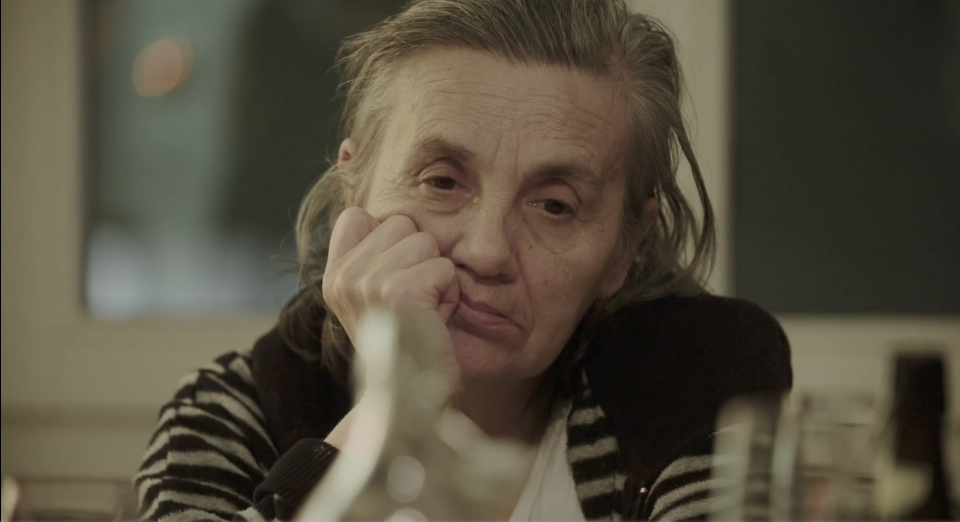
Still from Dida.
But in Serbia, or in many other countries you just don’t do that. You really have to find the solution differently and in our story we had to find it earlier because of Dida’s needs. She cannot live on her own, and I think each of us has the same question as soon as parents cannot live on their own anymore.
Nikola: Caring for the elderly is first a cultural thing and then a financial thing. Many people here don’t have money. Young people live with their parents until they marry or maybe even afterwards with children in a small space. This is a reality.
Corina: I think it has two sides. In the Balkans it is very bad that the state doesn’t cover this. But on the other hand I really also like this approach in Serbia because I think in Switzerland we are losing more and more contact with families. And everybody is living on their own and we don’t have this family network.
Nikola: In my case I am super lucky because I can support my mother and you can pay this lady who takes care of her and we can pay her bills.
If I would live in Belgrade, who knows, if I had a shitty job of 200 euros I don’t know how I would do this.
Corina: Probably you would live together with her.
Nikola: This is the reality of many people, this is kind of… to get independence is quite hard if you don’t have a good start.
Women, and particularly older women, are so rarely the main subjects of film or in the media. Whether that is because of ageism and broader patriarchal structures, or a lack of self-assurance because of the way girls are raised. But Dida and Baba, who have never been filmed, come across like professional actresses. They seem like naturals.
Nikola: They became quite trained. I would film all the time when I had a camera; I’d make some stupid teenager jokes with them, so it was easy for everything to be spontaneous with them.
Corina: It is really funny that all the movies I did are with men and we didn’t realize that it was always with men. And now it is cool that we have a movie about women and (Corina turns to Nikola) even though you are actually one of the main characters, it is a man dealing with women.
And about Baba and Dida and them being natural I really think they enjoy all the attention from Nikola, that we are there and that we do something together. And Baba for sure did us a favor and trusted us, and she knew that it is about our life and she wanted to support us. And Dida really loves to be filmed. She is really like, “Where is the movie? Bring me photos of my posters!” She has in her flat now all the posters of the film.
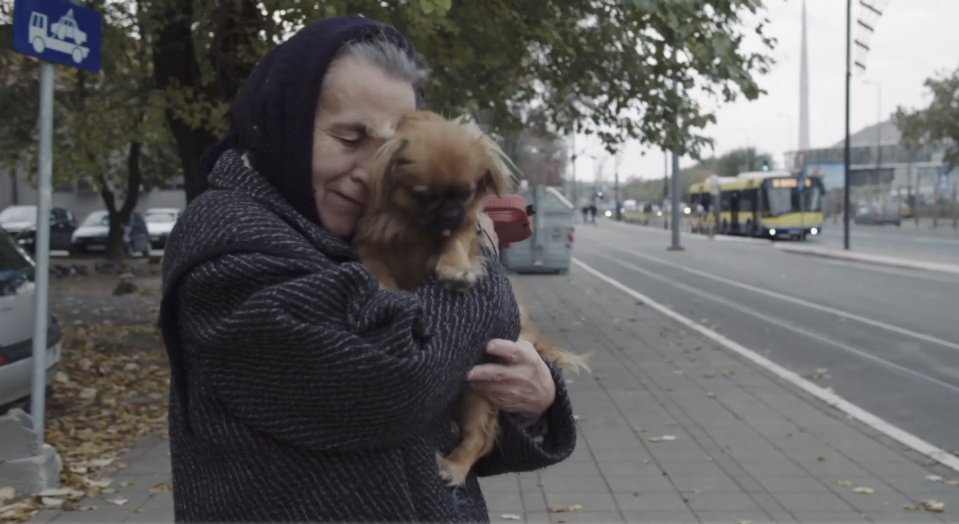
Still from Dida.
Baba is a very important part of the documentary, particularly in the first 30 minutes of it. And of course she also has a striking presence and personality, the absence of which is felt after she passes away. How was it for you to continue this filming journey without her?
Nikola: For Dida, it is part of her illness that she just switches. She never went to the graveyard and I asked her, “Don’t you feel like going sometime?” But she just continues life. She has a lack of empathy.
Corina: She only knows that she loves Nikola, and that’s all. But she doesn’t know when it’s his birthday, she knows when he has a headache and he is feeling bad. And she knows she needs to feel sorry for him because she learned it from Baba but she doesn’t really feel it. It is a lack of empathy. It is just her in the center of everything.
Nikola: We were doing this workshop and we were in Prague, going there a few times where we developed the movie. We were in the second part toward the end and we had a big problem, we didn’t know where the focus was. We had the grandmother, we had Dida, and the workshop participants were like, “What do you want to say?” and we were always saying, we want to show this symbiotic bond between them, how they work as one.
And they were like, “This is your role, and you have to come in.”
I was always, “No, I don’t want to go in front of the camera.”
And it was 1 a.m., my cousin calls and says “Your grandmother died.”
Corina: It was the last day of the workshop.
Nikola: And the next day we met some people from the workshop and they said, “I am sorry to tell you but now you have your focus. Now you know what to shoot.”
So the death of grandmother kind of put us in this spot to move on. Because we were super lost. We were like, “This movie will never end.”
And then it became about Dida.
Nikola: Then it became about Dida, and then I had to eventually go on with my voice.
And also one thing about grandmother’s death is that Corina and Miriam, our editor, thought that dramaturgically the movie should start with the death of grandmother and to start when Dida is alone.
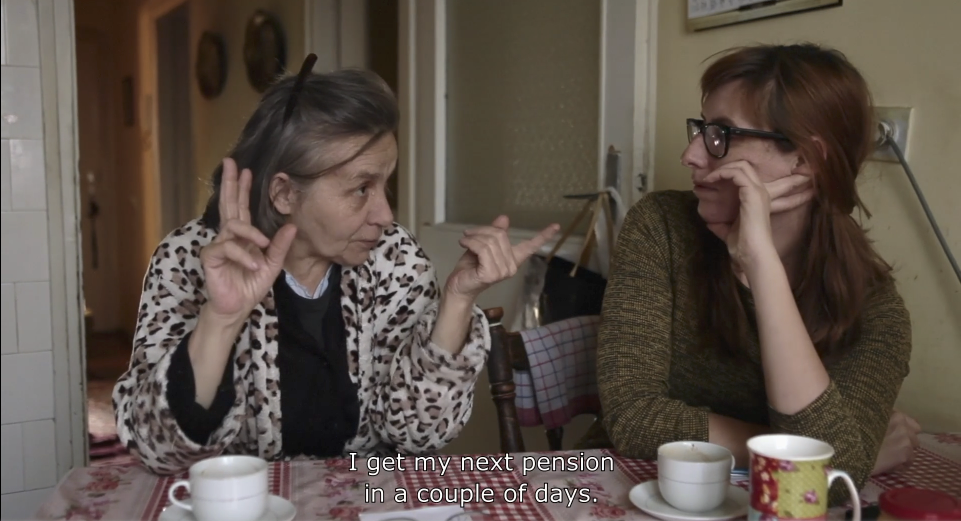
Still from Dida.
I was like, I cannot let go of my grandmother in the movie. She is a huge part of the movie and we had a discussion about how we are gonna do it, and eventually grandmother had her part.
You said earlier that you hesitated to be part of the movie, and later to do the voice-over. It is an intimate portrait of your family. Were there times when it became too uncomfortable?
Nikola: It was really uncomfortable. And the voice over… It took a long time to write it, to speak it out. I wrote something and a friend of ours, also a filmmaker from Belgrade, I showed her the text and she was like, “Don’t act like an Englishman, don’t be so informative. You need to give us the dirty laundry, you need to give us the feeling.”
And it took me a long time to say this, how to say to Dida that she is special. I didn’t know how to say this to her. I am still kind of afraid when she sees the movie. It took me some time as it was hard to get the balance and still to be deep.
This article has been edited for length and clarity. The conversation was conducted in English.
Feature image: Atdhe Mulla / K2.0

